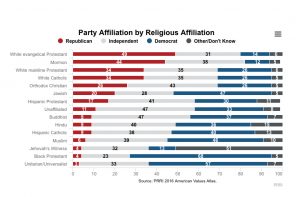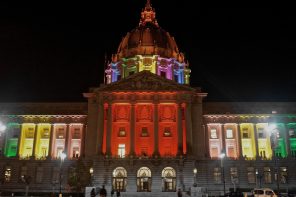A couple of weeks ago my partner and I shared a table with a rowdy group of young twenty-something lesbians at a local bar that featured live music. We had come for the early show and were about to leave when the young women who had taken over our table asked us to stay on for the late show. Being in our 40s, my partner and I checked our watches — it was almost time for our 10 o’clock bedtime — but these women, who we had just met, were so charming and insistent, we decided to stay.
In the course of our conversation, it was revealed that I was a pastor, which led each of them to recount horror stories about how their childhood churches treated them. One woman in particular told stories of her fundamentalist upbringing and how the church made sure that she knew she would go to hell if she “chose” to be a lesbian.
“I won’t ever set foot in church again,” she vowed. So much for recruiting her musical skills into my budding new church, I thought. She took my card at the end of the night, so who knows — perhaps the lure of playing her guitar in front of an appreciative crowd might help her overcome her church-phobia.
This young woman and her friends are, sadly, not an anomaly in the younger community of LGBT people. Church is seen as the enemy — something to escape from and count your lucky stars that you survived in one piece — though with permanent scars.
A new poll from the Public Religion Research Institute reveals our new lesbian friends are among the plurality of Americans who say “that messages coming from places of worship are negative.” Forty-percent of those polled agreed that “these messages contribute ‘a lot’ to negative perceptions of gay and lesbian people.”
Those negative perceptions can have a life or death impact on LGBT people. With the recent rash of suicides among young people who have been bullied over their sexual orientation, or perceived sexual orientation, the messages coming from churches is extremely important.
The poll showed that 33 percent of those polled believe the churches’ messages are contributing “a lot” to “the higher rates of suicide among gay and lesbian youth,” but oddly 21 percent say hearing condemnation from the pulpit doesn’t contribute to those suicides at all.
“The survey shows that a significant number of Americans are aware of and concerned about the negative impact of messages about homosexuality from places of worship, particularly with regard to gay and lesbian youth,” said Dr. Robert P. Jones, CEO of Public Religion Research Institute. “Notably, despite the negative evaluations of places of worship in general, Americans are more likely to give their own places of worship high marks; nearly half Americans give their own place of worship either an “A” (28 percent) or a “B” (17 percent) on their handling of this issue.”
Among those giving high marks to how their churches are “handling the issue of homosexuality” are white evangelicals who give their church an “A” (49 percent) or a “B” (27 percent).
Catholics are most likely to rate their churches negatively, with 15 percent doling out a “D” and another 16 percent giving an “F.”
Those are interesting numbers given that most white evangelical churches are more often than not where some of those “negative” messages about homosexuality emanate from. Yet white evangelicals are pleased with the message they hear about it in their churches. Could it be that they don’t perceive messages that homosexuality is sinful to be “negative” messages, but instead a “positive” message that with Jesus you can choose to not be gay?
While on the Catholic side, it seems a bit more transparent, since most Catholics are far more progressive on the issue of homosexuality than the Vatican. Catholics in the pews seem to see messages of the “sinfulness” of homosexuality as negative.
The confusion may clear up, even if just a tiny bit, as you delve deeper into the numbers, according to Jones. Their polling showed that large majorities of white evangelicals and black Protestants said they believed homosexuality was a sin (79 percent and 67 percent respectively), while white mainline Protestants and Catholics do not consider it sinful (63 percent and 56 percent).
“So the pattern is that groups that are more likely to believe homosexuality is a sin are both more likely to give churches high marks and less likely to say messages are negative,” Jones told RD.
Mainly because, we are left to conclude, they don’t see the preaching of homosexuality as a “sin” as something “negative.”
Just like at my table the other night, the generational gap shows in this polls as well. Nearly half (47 percent) of young people polled believe that messages coming from the church contribute “a lot” to the negative views of LGBT people. Just 30 percent of those 65 and old thought so.
At my table that night, however, 100 percent of the young adults at my table believed the church was too negative — and they were glad to be rid of it.




